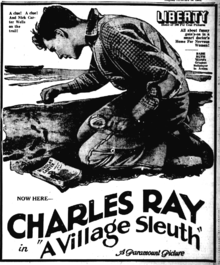The Village Sleuth
The Village Sleuth is a 1920 American silent comedy drama film directed by Jerome Storm and written by Agnes Christine Johnston. The film stars Charles Ray, Winifred Westover, Dick Rush, Donald MacDonald, George Hernandez, and Betty Schade. The film was released on September 12, 1920, by Paramount Pictures.[1][2] A copy of the film is in the Gosfilmofond film archive.[3]
| The Village Sleuth | |
|---|---|
_-_Ray.jpg) Still with Charles Ray | |
| Directed by | Jerome Storm |
| Produced by | Thomas H. Ince |
| Screenplay by | Agnes Christine Johnston |
| Starring | Charles Ray Winifred Westover Dick Rush Donald MacDonald George Hernandez Betty Schade |
| Cinematography | Chester A. Lyons |
Production company | Thomas H. Ince Corporation Famous Players-Lasky Corporation |
| Distributed by | Paramount Pictures |
Release date |
|
Running time | 50 minutes |
| Country | United States |
| Language | Silent (English intertitles) |
Plot
As described in a film magazine,[4] William Wells (Ray), a farm boy with a consuming desire to be like Sherlock Holmes, takes his first "detective" commission from his father Pa Wells (Morrison) and seeks to discover the identity of some watermelon thieves. Discovering the culprits among his own gang of friends and his father finding this out, he goes on a wider path to become a detective. Obtaining work as a hired man for a health resort, William begins an untiring hunt for a mystery. He gets a taste of the real thing when a robbery and murder come rapidly racing one over the other. In the end the man supposedly murdered makes his appearance and the sleuth uncovers the robbery culprit in an ex-convict guest of the resort. Pinky (Westover), a chorus girl in cahoots with the "murdered" man, gives William a lively time in keeping faith in her, but proves her trust in the end.
Cast
- Charles Ray as William Wells
- Winifred Westover as Pinky Wagner
- Dick Rush as David Keene
- Donald MacDonald as Dr. Roberts
- George Hernandez as Mr. Richley (credited as George F. Hernandez)
- Betty Schade as Mrs. Richley
- Louis Morrison as Pa Wells (credited as Lew Morrison)

Promotion
From a newspaper advertisement for the film:
- "As a country boy, with aspirations to become a great detective, Charles Ray is said to afford considerable laughter and a few thrills in A Village Sleuth . . . After his attempts to round up some melon thieves in his dad's apple orchard, have gotten him into hot water, Charlie goes out and gets a real job in a private sanitarium. There he encounters a real mystery and, his detective instincts aroused starts to unravel it. The results are surprising in the extreme. Charlie is revealed not only as the logical successor to Sherlock Holmes but wins a pretty girl in the bargain. A Village Sleuth was written by Agnes Christine Johnston, scenarist of Twenty-three and a Half Hours Leave, and produced for Paramount release by Thomas H. Ince. Winifred Westover is the leading woman. Jerome Storm directed." [5]
Preservation status
Copies of The Village Sleuth are held at the Library of Congress, Gosfilmofond, UCLA Film and Television Archive, Academy Film Archive, and Jugoslovenska Kinoteka.[6][7]
References
- "Village-Sleuth - Trailer - Cast - Showtimes - NYTimes.com". nytimes.com. Retrieved January 19, 2015.
- "The Village Sleuth". afi.com. Retrieved January 19, 2015.
- Progressive Silent Film List: The Village Sleuth at silentera.com
- "Reviews: The Village Sleuth". Exhibitors Herald. New York City: Exhibitors Herald Company. 11 (10): 103. September 4, 1920.
- "Charley Ray Makes "Village Sleuth" A Rollicking Feature". Bisbee Daily Review. Public domain text, published in the USA before 1921. Bisbee, Arizona. September 25, 1921. Retrieved April 21, 2015.CS1 maint: others (link)
- The Library of Congress/FIAF American Silent Feature Film Survival Catalog: The Village Sleuth
- Catalog of Holdings The American Film Institute Collection and The United Artists Collection at The Library of Congress, (<-book title) p.201 c.1978 by the American Film Institute
External links
| Wikimedia Commons has media related to The Village Sleuth. |